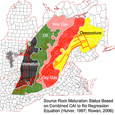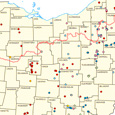New Pennsylvania rules make water quality priority
Wednesday, November 12, 2014

SALEM, Ohio — The Pennsylvania Department of Environmental Protection is working on new regulations for oil and gas policies.
The Pennsylvania Environmental Quality Board (EQB) proposed new regulations regarding surface activities related to oil and gas well development in December 2013. The DEP and EQB held an open comment period that closed in March 2014. There were 24,000 comments submitted. Now the board is replying to those comments.
In addition, public hearings were held across the state to gather more input about the proposed regulations.
The Environmental Quality Board will meet Jan. 8, 2015, for a draft rule making, and the DEP is hoping final regulations can be in place by late 2015.
More than 3,000 comments
Kurt Klapkowski, director for the Bureau of Oil and Gas Planning and Program Management, said the task of reviewing the 3,000 unique comments is daunting.
The response document is already 900 pages and growing, but it should be completed by the first quarter in 2015, said Klapkowski.
The proposed rules cover a lot of topics, but the areas affecting landowners include the venting of gas, casing and cementing, and water supply rules.
Water supply
Act 13 of 2012 enacted stronger environmental standards, created the impact fee that benefits local governments, and authorized local governments to adopt stronger environmental requirements. Some of those requirements are being added to the DEP revised regulations.
One area drawing a lot of attention deals with water supplies.
Once a company decides to drill, they will do a test of the drinking water supply around the drilling site. After the final unconventional well (shale well) is drilled, landowners within a 2500 feet zone have 12 months to report their water supply has been damaged.
The new regulations will presume drilling affected their water supply unless the drilling company can prove they didn’t impact it.
If the landowner had good drinking water before the drilling, then drilling operators will have to provide a better water supply after they drill. If the pre-drilling water test didn’t show good drinking water before the drilling, then the company will have to provide water that is at least that level of drinking water.
Klapkowski said there is little doubt that drilling has had an impact on the drinking water supply in Pennsylvania and the idea is to make sure water stays safe.
“We don’t want them to impact the drinking water supply, but if they do, we want it to be put back to drinking water status,” Klapkowski said.
Casing and cementing
One big change regarding the casing of wells has to with abandoned wells. The DEP is requiring operators to do a survey of abandoned wells before they stimulate or frack the well, and plug any abandoned wells before stimulating the new one.
Klapkowski said there are thousands of abandoned wells in Pennsylvania and there are no maps detailing their location. Some wells were drilled as early as 1910 and are abandoned today.
Klapkowski said this is where landowners will be needed, especially on property that has been in the family for years. They may remember that a relative had one drilled in a corner of the property that is not visible or on a map.
Venting of gas
Klapkowski said the changes to venting of gas regulations will also apply to flaring. He said that Pennsylvania is putting forth regulations tougher than what is required by the federal government, by requiring a technological fix, or enclosed venting.
The revised rules will be part of the general permitting process for well sites, however the rules will also apply to pipelines, compressors and other auxiliary equipment in the oil and gas industry.
Klapkowski said there will be limited venting, but it will only be used for safety reason. This means that if a company can justify it is needed for operational efficiency of a pipeline or other equipment or that they are in danger of losing control of a well, then they can vent it.




